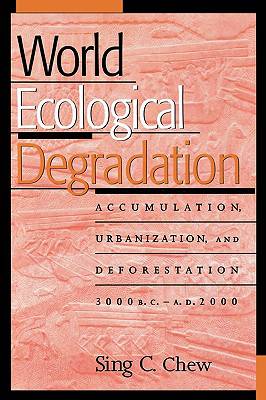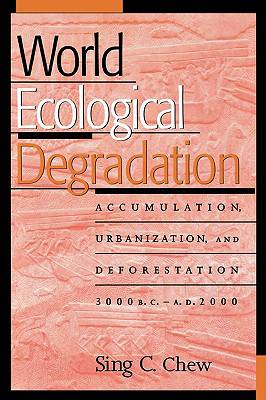
- Afhalen na 1 uur in een winkel met voorraad
- Gratis thuislevering in België vanaf € 30
- Ruim aanbod met 7 miljoen producten
- Afhalen na 1 uur in een winkel met voorraad
- Gratis thuislevering in België vanaf € 30
- Ruim aanbod met 7 miljoen producten
Zoeken
World Ecological Degradation
Accumulation, Urbanization, and Deforestation, 3000BC-AD2000
Sing C Chew
Paperback | Engels
€ 93,45
+ 186 punten
Omschrijving
Deforestation, soil runoff, salination, pollution. While recurrent themes of the contemporary world, they are not new to us. In this broad sweeping review of the environmental impacts of human settlement and development worldwide over the past 5,000 years, Sing C. Chew shows that these processes are as old as civilization itself. With examples ranging from Ancient Mesopotamia to Malaya, Mycenaean Greece to Ming China, Chew shows that the processes of population growth, intensive resource accumulation, and urbanization in ancient and modern societies almost universally bring on ecological disaster, which often contributes to the decline and fall of that society. He then turns his eye to the development of the modern European world-system and its impact on the environment. Challenging us to change these long-term trends, Chew also traces the existence of environmental conservation ideas and movements over the span of 5,000 years. Can we do it? Look at Chew's evidence of the past five millennia and decide. Ideal for courses in environmental history, anthropology, and sociology, and world-systems theory.
Specificaties
Betrokkenen
- Auteur(s):
- Uitgeverij:
Inhoud
- Aantal bladzijden:
- 232
- Taal:
- Engels
Eigenschappen
- Productcode (EAN):
- 9780759100312
- Verschijningsdatum:
- 25/05/2001
- Uitvoering:
- Paperback
- Formaat:
- Trade paperback (VS)
- Afmetingen:
- 148 mm x 228 mm
- Gewicht:
- 367 g

Alleen bij Standaard Boekhandel
+ 186 punten op je klantenkaart van Standaard Boekhandel
Beoordelingen
We publiceren alleen reviews die voldoen aan de voorwaarden voor reviews. Bekijk onze voorwaarden voor reviews.











